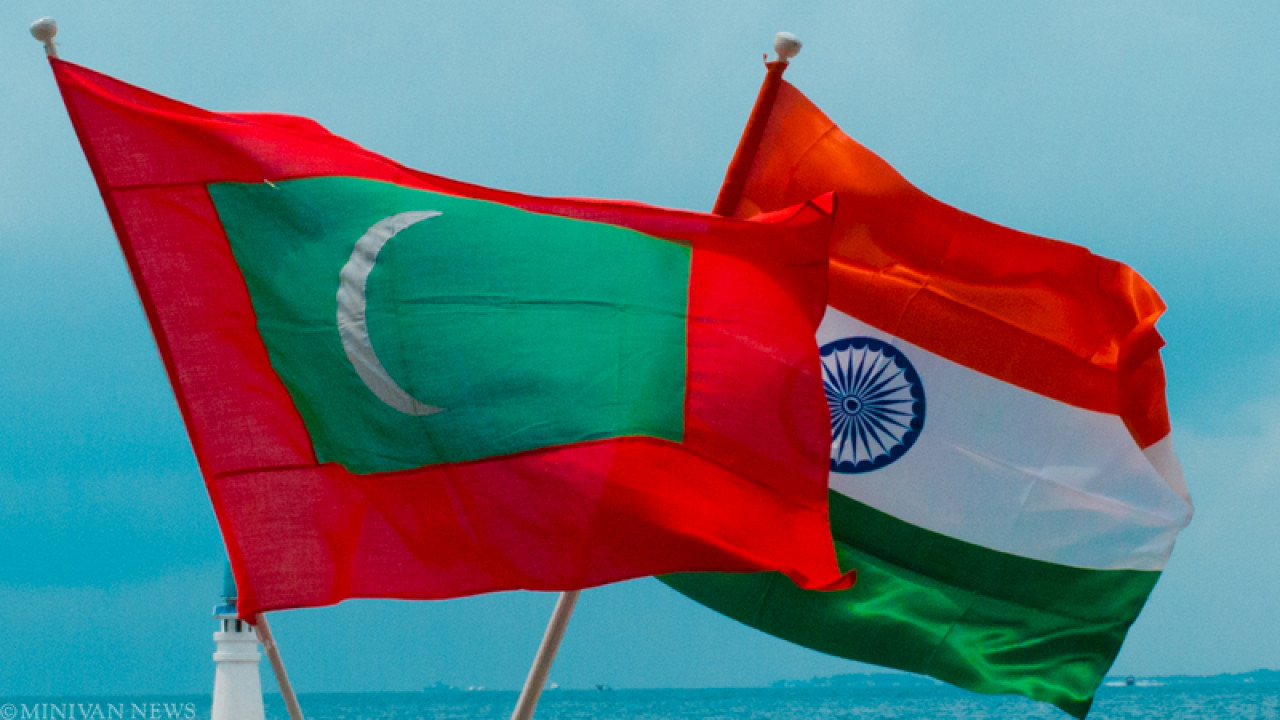The India-Maldives relationship is interpreted in several perspectives.The relations apparently evolved and progressed not on equal platform. It would in fact be stupid to expect them to have evolved on similar platforms, as both countries are different in all scale.
The development of this relation can be recalled from our history books. The most prominent aspect from history is that all foreign invasion and threats that came to Maldives came from the Indian sub-continent. The Portuguese and the Malabar launched their offensive from the Indian coast.
Our ancestors successfully defended the nation from the attacks and invasions that came from our bigger neighbor. Yet, our forefathers were not skillful in establishing a system of government that allowed us to accommodate the differences and disagreements. Due to the political differences they were not able to forecast the complications that would arise due to modern day trade, which was an avenue for India to penetrate the Maldivian economy through their Bora traders in the 18th century. The Boras came to Maldives by invitation of the then ruling family, the Kakaage clan, to weaken their rival, the Athireege clan.
Athireege clan was not any less powerful. They had wealth, political prowess and foreign connections which facilitated the arrival of the British just 30 years after the Boras came to Maldives. The British came with the intention of assisting Athireege clan, though the pretext for the intervention was to protect the Bora from any harm.
After Maldives became a British protectorate, the political influence of Athireege clan escalated. Yet despite their political dominance, they were not able to drive the Boras out. Towards the end of Athireege clan rule, the political foes Athireege and Kakaage united through strong family marriages. So it was not in the best interest of the ruling families to impair the Boras. Furthermore the Maldivian government was in debt to the Boras, and the Maldivian elite were equally indebted to them, so the Boras had a free hand to manipulate the Maldivian economy to their desire.
Undoubtedly, the internal political quarrel between two elite clans was a costly exercise for the country, although the two clans later forgave each other and worked together. But due to this domestic tension, the Boras took full advantage of the situation and held their control on the economy of Maldives for 105 years, while the British meddled with our external and internal affairs for over 78 years.
In our struggle to gain independence from the British, the then young and energetic Prime Minister of Maldives Ibrahim Nasir sought assistance from India. However, Prime Minister Nehru did not give any considerable assistance, perhaps because Nasir’s policy on the Boras did not appeal to the Delhi government. Yet, India was early to recognize the newly-formed independent nation of the Maldives.
Formal diplomatic relations between India and Maldives were established in the early 1970s, and modern day commercial relations began from there on. The State Bank of India was established in the Maldives, amalgamating the tourism industry in to Maldives.
Indian Prime Minister Indira Gandhi visited during this period and assured that Indian foreign policy will not, at all, intervene in the internal affairs of the Maldives.
However, this can be treated as a diplomatic nicety as it is evident that India had a bigger plan of a larger India, which it intended to pursue. This policy had been executed at different times on its neighbors. Thus, since India’s independence in late 1947, India had cold relations with its neighbors, be it Pakistan, China, Bangladesh, Nepal, or Sri Lanka.
Despite the geographic and economic disparities, mutual trust developed between the leaders of the two countries during the 70s and 80s. The reason could have been that since India had a socialist economic policy and its budget depended on foreign aid, it was not in their best interest to influence the micro state in the region.
India came to the focus of the common Maldivian when it came in full force to save us in 1988, from an attack by a group of Tamil terrorists from Sri Lanka, a breakaway faction of the Liberation Tigers of Tamil Eelam (LTTE).
Thereafter, we have seen economic assistance from the Indian government. The Indira Gandhi Memorial Hospital and the Faculty of Engineering Technology (FET) are landmarks of these aids.
These infrastructural assistance took almost a decade to materialize, which meant that the much-deserved appreciation was delayed or not given at all. In fact, it was understood to be part of the master-servant philosophy which exists in the Indian caste system - which does not sink well in this 100% Muslim micro state. Hence, in comparison, assistance from other nations materialized much quicker and was often better class.
India is a nationalistic country, and within India there are pressure groups who want India to be bold in its decisions – such as the one whereby Nehru marched on to Goa and drove out the Portuguese. India’s role in the independence of Bangladesh and in taking over the State of Sikkim are incidents most Indians take pride in, and want its government in Delhi to demonstrate.
When Maldives openly declared that it has terrorists trained in camps in Pakistan, some Indians questioned their government whether any action was being taken about having a hostile country at their fringe. Similar to 1988 when Maldives was attacked by Tamil terrorists, the Indians came in like lightning. At the same time, sentiment existed that India should act now to eliminate the anxiety. To release the tension on this issue, we are now in India’s security grid by agreement - India provides navigational surveillance to the Maldives as required.
It must not be ignored that India has the best disaster contingency plan in the region. This has been tested and proven, most notably during the tsunami of 2004 when India was quick to give assistance to Maldives.
The last 3 Maldivian presidents frequented Delhi and were received cordially. Undeniably the most pro-Indian Maldivian president is Mohamed Nasheed. In a recently published book “The Blood Telegram: Nixon, Kissinger and a Forgotten Genocide”, author Princeton University Professor Gary Bass says that the 37th President of the US, Richard Nixon wondered during a meeting at the Oval Office, why every ambassador who went to India fell in love with it -this is true for President Nasheed. With President Mohamed Waheed, however, the diplomatic and commercial relations between India and Maldives hit the lowest point in history when the Maldivian government’s contract with GMR to lease the Ibrahim Nasir International Airport (INIA) was cancelled.
Following the cancellation of the lease of INIA to GMR, a series of actions were taken by Delhi to tighten trade and travel with Maldives. These actions by Delhi severely damaged and weakened President Waheed’s government, which was struggling to repay the budget support loans taken from India by the previous administration.
Before the presidential election, India called all contenders to Delhi, and during these visits India expressed that they will do everything short of invasion to pull President Waheed out of office. While in India, none of the Maldivian politicians spoke against GMR, and President Gayoom made a mixed statement which upon his return he said was misinterpreted by the Indian media. Eventually President Waheed paid dearly for not following the master - he anticipated his domestic popularity by getting back the INIA and skewed polls would win him office for another term.
Just after the cancellation of the rerun of the presidential election, Indian Foreign Secretary Sujatha Singh visited Maldives and met with all the stakeholders.In the words of the Ms. Sujatha, “what affects Maldives affects us”. This is a rightful statement from Indian perspective, as there are around 28,000 Indians employed in the Maldives. India also has investment in Maldives - Taj group operates 2 resorts, Reliance and Tata have real estate investments, GMR has interest to return to takeover INIA, Giyasudeen School is operated by Shri-Educare, and there are several MOUs signed by Indian investors on energy, health, education and waste management which are under active consideration. The State Bank of India has its fingers in almost all of the larger hotel projects.These are all reasons why India cannot just turn a blind eye to the Maldives. Moreover, State Bank of India has lent budget support to government, so India cannot let the Maldivian government fail and falter on dues.
However, it is a pity that Ms. Sujatha was not able to see through Maldivians’ eyes. Lots of Maldivians do not trust Indians, and they do not have the same sentiments towards India as they do towards other neighboring countries, such as Sri Lanka.
One reason for this is that Maldivian medical tourists who have frequented India since the late 1980s have been subjected to harassment in India; for example, the episode in the 90s where a Maldivian woman was unfairly arrested and jailed in India. During this period, due to increased incidents of mistreatment of Maldivian tourists, the Maldivian Minister of State for Defence had to make several visits to Delhi to appeal to spare the innocent Maldivians who were being harassed at the airport and other places in India. Recently, India tightened its procedures on the medical tourist visa, which previously was an on-arrival visa for Maldivians.
Maldivians had to queue in front of the Indian embassy in Male’ to obtain approval for their visits to India. This is not taken positively by Maldivians -again another example of the master-servant policy played by India to harass the common person. Moreover, the sudden restrictions on gravel and other trade items have strained the local business and construction sectors.
All these are mutually beneficial for the economies of the two countries, however, India prefers to impose restrictions,which suggests that India is working on a strategic policy and conniving to weaken Maldivian economy – a policy designed to eventually control the Maldivian economy.
In the book “The Blood Telegram”, it is said that President Richard Nixon told a State Department official, “The Indians are more devious, sometimes so smart that we fall for their line”.
We now live in a different era than the time of Bora traders. India is stronger and getting stronger than ever. It is anticipated that India will become the 4th largest economy in the world in the next decade. Many countries, seeing India’s progress, are developing ties with them. We, who are less than an hour’s travel away from India, should learn to live with our large neighbor. We should protect our individuality and sovereignty, and at the same time get the progress we well deserve and anticipate.
This article was published in Haveeru on November 7, 2013.



